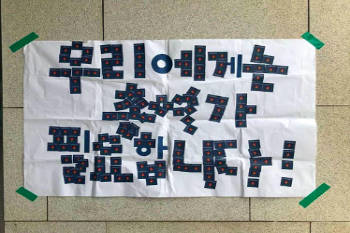
Although Women’s Student Government Associations (WSGA) have long been among the most prominent student societies in Korean universities, their stature has fallen greatly in the past five years. Among the major universities in Seoul, only Dongguk University’s WSGA remains.
The first WSGAs were established in 1984 at Seoul National and Korea University. After their establishment, several WSGAs appeared in schools including Yonsei and Sungkyunkwan University. However, most universities’ WSGAs are now defunct. Even those that have not been completely abolished have no candidates to run the associations, and the groups have been forced to close temporarily or be run by the universities’ Emergency Committees.
Even though WSGAs are on the downturn among current universities in Korea, there has been an interesting development from Sungkyunkwan University. Though the school’s WSGA had remained inactive since 2009, some students have recently organized the Sungkyunkwan Gender Equality Group and asserted their opinions on reconstructing the WSGA in Sungkyunkwan.
The group’s purpose is to support the reconstruction of WSGA. The major reason for this has been the rise of the #MeToo movement, which has swept South Korea and reached universities. Early this year, several members of the school raised accusations against some male professors and students. However, the university’s Central Committee and Student Council have insufficiently handled the incidents according to Sungkyunkwan Gender Equality Group. It aims to support minorities such as disabled students and LGBTQs, who receive little support at Sungkyunkwan.
“Many cases regarding sexual harassment or abuse take place on campus, but there is no specific manuals or policies for these problems, and they do not put enough effort into resolving the cases,” the group said.
Even though they have been trying their best to rebuild the WSGA, the central committee and the student council questioned credibility of a previous bylaw containing an article regarding the management of the WSGA election. After several meetings, the central committee got the rights on the reformation of the bylaws, and the final stage of it was about to be held.
However, during the conference on how to manage the election under the reformed bylaw, one of the representatives at the general representatives meeting made a proposal on the total vote on the abolishment of the WSGA. The agenda passed by the consent of one-third of the representatives.
“We were confused because only the final stage was left to pass the amendment of the WSGA’s bylaw, which would have allowed us to continue with our election process based on the revision,” Sungkyunkwan Gender Equality Group stated. “Little did we know that the Student Council was simultaneously holding a plenary vote on the agenda to abolish the WSGA.”
While Sungkyunkwan is trying to reconstruct the WSGA in the face of challenging circumstances, Yonsei University’s WSGA was closed after 30 years of operation in May. After Yonsei WSGA hosted a lecture by Eun Ha-sun, controversy arose on campus because of her past posts belittling Christianity and comments that could be judged as misandristic, expressing hated toward men. It is believed that this provoked public opinion toward the abolishment of WSGA.
The agenda about the reformation of Yonsei WSGA passed after the total vote in which 55.2 percent of the student body participated, with 82.2 percent of the votes in favor. Now, Yonsei’s WSGA has changed to Students Rights Board, and its members and voters have been increased from only women students to include all undergraduates.
The existence of WSGAs still remains controversial in Korea. People are still debating whether they are needed to protect female students’ rights or if they are just another case of “reverse discrimination.”
“We think the decline of WSGAs is a pitiful situation,” Sungkyunkwan Gender Equality Group said. “The reason for this is that some believe women no longer need to be protected because of the steady increase of institutional policies. Also, backlashes over women’s groups are being fueled by people who negatively view feminism.”

